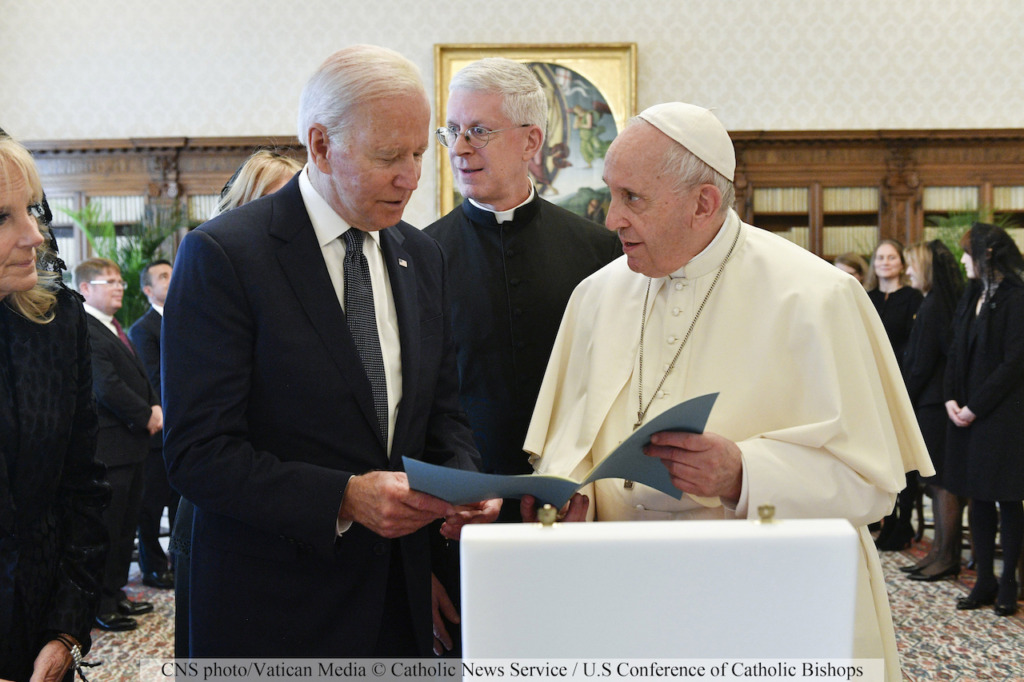VATICAN CITY (CNS) – In documents issued his first 10 years in office, Pope Francis covered topics as diverse as strengthening one’s faith, evangelization, caring for creation, accompanying families and young people, and respecting indigenous peoples.
He wrote a major document on reforming the Roman Curia, three encyclicals and five apostolic exhortations. Here is a list of his major texts:
Apostolic constitution:
— “Praedicate Evangelium” (“Preach the Gospel”). The pope’s long awaited apostolic constitution on the reform of the Roman Curia was released in 2022. It replaced St. John Paul II’s 1988 constitution, “Pastor Bonus,” and reorganized the Roman Curia to highlight its role in promoting the church as a community of missionary disciples, sharing the Gospel and caring for all those in need.
Apostolic letters:
— “Desiderio Desideravi” (“I have earnestly desired”). In this 2022 letter, the pope insisted that Catholics need to better understand the liturgical reform of the Second Vatican Council and its goal of promoting the “full, conscious, active and fruitful celebration” of the Mass. He reflected on the power and beauty of the Mass, emphasized the need to limit celebrations of the liturgy according to the rite in use before the Second Vatican Council and called for greater awareness of the sacrifice of Christ and his real presence in the Eucharist.
— “Traditionis Custodes” (“Guardians of the Tradition”) was published in 2021 and declared the liturgical books promulgated after the Second Vatican Council to be “the unique expression of the ‘lex orandi’ (law of worship) of the Roman Rite,” restoring the obligation of priests to have their bishops’ permission to celebrate according to the “extraordinary” or pre-Vatican II Mass and ordering bishops not to establish any new groups or parishes in their dioceses devoted to the old liturgy.
— “Vos Estis Lux Mundi” (“You are the light of the world”). The document, published in 2019, revised and clarified norms and procedures for holding bishops and religious superiors accountable when accused of abuse or of covering up for priests or other churchworkers accused of sexually abusing minors or vulnerable adults. It requires all priests and religious to report suspected abuse or cover-ups and encourages any layperson to report through a now-mandated reporting “system” or office that must be set up in each diocese.

Encyclicals:
— “Lumen Fidei” (“The Light of Faith”) was Pope Francis’ first encyclical, published in 2013. It was built largely on the work of his predecessor, Pope Benedict XVI, completing a trilogy of encyclicals on the theological virtues of faith, hope and love. The encyclical on faith encouraged Catholics to embrace their faith more fully.
— “Laudato si’, On Care for Our Common Home” was published in 2015. He said his encyclical on the environment was a means of entering into dialogue with all people about humanity’s responsibility toward “the common home that God has entrusted to us.”
— “Fratelli Tutti, on Fraternity and Social Friendship” was published in 2020. It highlighted what the pope said were urgent social, political and religious issues and the need to address them together based on the truth that all people are brothers and sisters, leading to greater solidarity and concern for the poor and the Earth.
Post-synodal apostolic exhortations:
— “Evangelii Gaudium” (“The Joy of the Gospel”). The document on the proclamation of the Gospel in today’s world was published in 2013 with the aim of encouraging ongoing the missionary renewal of all members of the church. Calling for a new chapter in evangelization, the pope also provided a clear guide to joy of the beatitudes, the grace of discernment and the signs of holiness that express a person’s love for God and neighbor.
— “Amoris Laetitia” (“The Joy of Love”). The pope’s 2016 post-synodal exhortation on marriage, love and family life brought together the results of the two Synods of Bishops on the family, looking at the challenges experienced by families and affirming the importance of accompaniment when providing pastoral care, particularly to people seeking to regularize their marriages.
— “Gaudete et Exsultate” (“Rejoice and Be Glad”). The 2018 apostolic exhortation on the call to holiness challenged Christians to take the dignity of all human life seriously, viewing it in light of Christ’s incarnation. The pope offered a road map for simple ways that everyday people can be holy.
— “Christus Vivit” (“Christ is Alive”), published in 2019, was the pope’s response to the 2018 Synod of Bishops on young people, the faith and vocational discernment. In the text, the pope told young people they are loved and valued and needed by the church and he pleaded with older members of the church not to stifle the enthusiasm of the young, but to offer gentle guidance when needed.
— “Querida Amazonia” (“The Beloved Amazon”) was a 2020 post-synodal exhortation in response to the Synod of Bishops for the Amazon. It called for an end to exploitation of the Indigenous peoples and the natural resources of the Amazon and for greater efforts to organize regular pastoral care of Catholics in the region, including by recognizing the role women play in Catholic communities, respecting popular forms of piety and working to inculturate the faith in Amazonian cultures.

